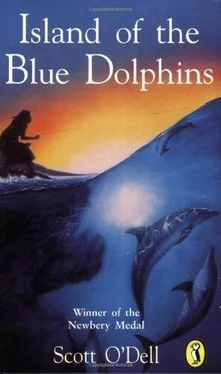Scott O'Dell - Island of the Blue Dolphins
Здесь есть возможность читать онлайн «Scott O'Dell - Island of the Blue Dolphins» весь текст электронной книги совершенно бесплатно (целиком полную версию без сокращений). В некоторых случаях можно слушать аудио, скачать через торрент в формате fb2 и присутствует краткое содержание. Год выпуска: 1966, ISBN: 1966, Издательство: PUFFIN BOOKS, Жанр: Детские приключения, на английском языке. Описание произведения, (предисловие) а так же отзывы посетителей доступны на портале библиотеки ЛибКат.
- Название:Island of the Blue Dolphins
- Автор:
- Издательство:PUFFIN BOOKS
- Жанр:
- Год:1966
- ISBN:978-0-14-192524-0
- Рейтинг книги:3 / 5. Голосов: 1
-
Избранное:Добавить в избранное
- Отзывы:
-
Ваша оценка:
- 60
- 1
- 2
- 3
- 4
- 5
Island of the Blue Dolphins: краткое содержание, описание и аннотация
Предлагаем к чтению аннотацию, описание, краткое содержание или предисловие (зависит от того, что написал сам автор книги «Island of the Blue Dolphins»). Если вы не нашли необходимую информацию о книге — напишите в комментариях, мы постараемся отыскать её.
Island of the Blue Dolphins won the Newbery Medal in 1961. It was adapted into a film of the same name in 1964. O'Dell later wrote a sequel, Zia, published in 1976.
Island of the Blue Dolphins — читать онлайн бесплатно полную книгу (весь текст) целиком
Ниже представлен текст книги, разбитый по страницам. Система сохранения места последней прочитанной страницы, позволяет с удобством читать онлайн бесплатно книгу «Island of the Blue Dolphins», без необходимости каждый раз заново искать на чём Вы остановились. Поставьте закладку, и сможете в любой момент перейти на страницу, на которой закончили чтение.
Интервал:
Закладка:
In the middle of the group was a seated figure, a skeleton. It sat leaning against the wall with its knees drawn up and in its fingers, which were raised to its mouth, a flute of pelican bone.
There were other things there on the ledge, in the shadows among the standing figures, but having drifted far back in the room, I again paddled towards the opening. I had forgotten that the tide was coming in. To my great surprise the opening had narrowed. It was too small now for me to get through. We would have to stay there in the room until the tide went out, until dawn came.
I paddled to the far end of the cave. I did not look back at the glittering eyes of the figures on the ledge. I crouched in the bottom of the canoe and watched the shaft of light grow weak. The opening out to the sea grew smaller and finally disappeared. Night came and a star showed through the crevice overhead.
This star passed out of sight and another took its place. The tide lifted the canoe higher in the room, and as the water lapped against the walls it sounded like the soft music of a flute. It played many tunes through the long night and I slept little, watching the stars change. I knew that the skeleton who sat on the ledge playing his flute was one of my ancestors, and the others with the glittering eyes, though only images, were too, but still I was sleepless and afraid.
With the first light, another high tide almost setting, we left the cave. I did not look up at those standing quietly on the ledge or at the flute player playing for them, but paddled fast out into the morning sea. Nor did I look back.
‘I suppose this cave once had a name,’ I said to Rontu, who was as glad to be free as I was, ‘but I have never heard of it or heard it spoken about. We will call it Black Cave and never in all our days go there again.’
When we came back from our voyage to Tall Rock, I hid the canoe in the cave below the headland. It was hard work, but each time I would lift the canoe from the water and on to the ledge, even though I planned to go out the next morning.
Two summers had come and gone and the Aleut hunters had not returned, yet during these days I always looked for them. At dawn, as Rontu and I went down the cliff, I would watch the ocean for their sails. The summer air was clear and I could see many leagues. Wherever we went in the canoe I would never be gone longer than half a day. On the way home, I always paddled close to shore and looked for them.
It was the last time that we went to Tall Rock that the Aleuts came.
I had hidden the canoe and climbed the cliff with the ten cormorant skins slung over my back. At the top of the cliff I stood for a while gazing at the sea. There were some small clouds on the water. One of them, the smallest, did not look like the others, and as I watched, I saw that it was a ship.
The sun made bright scales on the water, but I could see clearly. There were two sails and it was a ship coming towards the island. For a long time I could not tell the colour of the sails. I wondered if it could be the white men, though now I thought about them little and seldom looked for them.
I left the cormorants hanging on the fence and went to the rock on the headland. I could see no better from the rock because the sun was low and the whole ocean was covered with light. Then as I stood there I remembered that the white men's ship would come from the east. This one had come from a different direction — from the north.
I still was not sure that it belonged to the Aleuts, but I decided to pack the things that I would take to the cave in the ravine. There was much to take — my two birds, the skirt I had made, the stone utensils, my beads and ear-rings, the cormorant feathers, and all of my baskets and weapons. The abalones were not yet dry so I would have to leave them.
When I had packed everything and put it beside the hole under the fence, I went back to the headland. I lay on the rock so I would not be seen and peered over its rim towards the north. For a moment I did not find the ship, and then I saw that it had travelled faster than I thought it would. It was already rounding the kelp bed, close to the rocks of Coral Cove. The last of the sun shone on the ship, on the bow, which was made like the beak of a bird, and on the two red sails.
I knew that the Aleuts would not come on shore in the dark, and that I had until morning to carry my things to the cave, but I did not wait. Most of the night I worked, making two trips to the cave. At dawn, when everything had been moved, I went back to the house for the last time. There I buried the ashes of my fires and threw sand over the shelves and the floor. I took down the shells I had put up to scare the gulls and tossed them and the abalones over the cliff. At last, with a pelican wing, I brushed away the marks of my feet. When I had finished, it looked as though no one had lived there for a long time.
By now the sun was up and I climbed on to the rock. The ship lay at anchor in the cove. Canoes were bringing goods to the shore and some were out in the kelp beds, beginning to hunt for otter. There was a fire on the shore and beside it, a girl. She was cooking something and I could see the fire shining on her hair.
I did not stay long on the headland. Always in the past I had gone to the ravine by a different way so as not to wear a trail. This time I went off towards the west, along the cliff, and then doubled back through the brush, being careful to leave no tracks. Rontu's prints did not matter because the Aleuts knew that there were dogs on the island.
The cave was very dark and I had trouble getting Rontu to go through the small opening. Only after I had crawled in and out several times would he follow me. I closed the opening with stones, and since I was tired, lay down and slept all that day. I slept until I could see the stars shining between the cracks in the rocks.
21
I did not take Rontu with me when I left the cave that night. And I closed the opening so that he would not follow me, for if the Aleuts had brought their dogs, he would surely smell them out. I went quietly through the brush to the headland.
Before I had climbed to the top of the high rock I could see the glow of the Aleut fires. They had camped on the mesa, at the place and the spring they had used before. It was less than half a league from my cave.
I stood for a long time watching the fires, wondering if I should move to another part of the island, perhaps to the cave where the wild dogs had lived. I was not afraid that the men would discover me, because they worked on the beach or hunted in their canoes all day. It was the girl I was afraid of. The ravine was tangled with brush, which was hard to walk through, but in the ravine grew seeds and roots. Sometime when she was out looking for food she might wander by the spring and see that it was being used and find my steps leading to the cave.
I stood on the rock until the Aleut fires died. I thought of everything I could do, of the different places I could go, and at last decided to stay in the ravine. The far end of the island had no springs, and if I moved there I would have no place to hide the canoe which I might need.
I went back to the cave and did not leave it until the moon was full. There was little food left. Rontu and I climbed to the headland and when we passed the house I saw that three of the whale ribs had been cut from the fence. No one was there or else Rontu would have barked. I waited until the tide was low, which was close to dawn, and filled a basket with sea water and abalones. We were back in the cave before it grew light.
The sea water kept the abalones fresh, but when we had to go out again the night was too dark to find our way to the reef. I therefore had to gather roots. I could never gather many before the sun rose, so I went out every morning until the next moon came. Then I went to the reef for abalones.
Читать дальшеИнтервал:
Закладка:
Похожие книги на «Island of the Blue Dolphins»
Представляем Вашему вниманию похожие книги на «Island of the Blue Dolphins» списком для выбора. Мы отобрали схожую по названию и смыслу литературу в надежде предоставить читателям больше вариантов отыскать новые, интересные, ещё непрочитанные произведения.
Обсуждение, отзывы о книге «Island of the Blue Dolphins» и просто собственные мнения читателей. Оставьте ваши комментарии, напишите, что Вы думаете о произведении, его смысле или главных героях. Укажите что конкретно понравилось, а что нет, и почему Вы так считаете.











